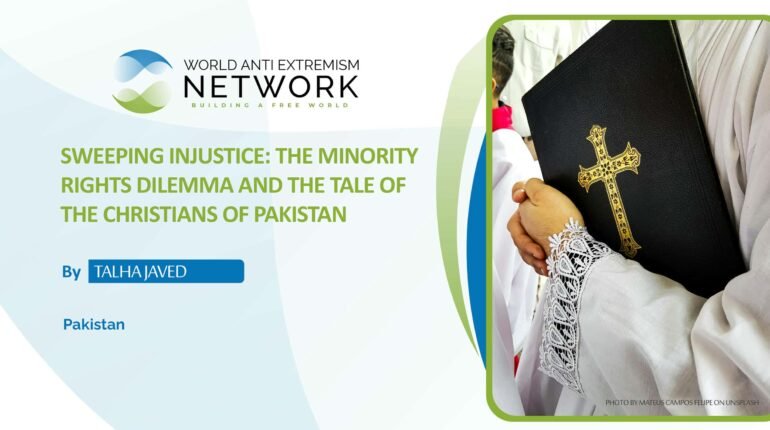From Fields to Factories: Child Labour in Pakistan’s Modern Workforce
- World Anti Extremism Network
- From Fields to Factories: Child Labour in Pakistan’s Modern Workforce

- From Fields to Factories: Child Labour in Pakistan's Modern Workforce
- By Zubia Shoukat
- NOV 02, 2024
Share on:
Introduction
Child labor is an unescapable issue in Pakistan, extending beyond traditional agricultural settings into the modern workforce. Millions of children are forced to work in factories, restaurants, and different brick kilns, jeopardizing their health, education, and future. This article explores the scope of the problem, its root causes, and the devastating cost for both children and Pakistan’s development. It concludes by proposing a multi-pronged approach to tackle child labor, including investment in education, family empowerment, stricter law enforcement, public awareness campaigns, industry regulation, and international collaboration.
Analysis
Child labor remains a persistent stain on Pakistan’s economic and social fabric. While the image of children toiling in agricultural fields is often associated with the issue, now child labor has a more nuanced and pervasive presence in Pakistan’s modern workforce.
Despite significant progress in recent years, child labor continues to be a considerable concern in Pakistan. According to the International Labour Organization and UNICEF’s 2020 global estimates, approximately 12.5 million children aged 5-17 are engaged in child labor in Pakistan. This translates to almost 9% of all children in this age group. The National Socioeconomic Survey conducted by the Pakistan Bureau of Statistics in 2018-19 found that 2.4 million children between the ages of 10-14 were involved in economic activity. These numbers paint a disturbing picture, highlighting the widespread nature of child labor in Pakistan.
Children are not only found working in traditional agricultural settings but also in various sectors of the modern economy, including brick kilns, textile factories, and service industries like car washing and restaurants.
Child labor in Pakistan evolved from working in agriculture and small workshops to being forced into work in factories during the Industrial Revolution. In the pre-industrial era, children from poor families had long worked to contribute to the family income, often in agriculture or as apprentices in small workshops. This was seen as a normal part of life and character-building for children.
The rise of industrialization in the 1800s led to a dramatic increase in child labor, as children were employed in factories, mines, and other industrial settings. Factory owners saw children as a cheap and docile source of labor that allowed them to stay competitive. Children were preferred because they were obedient, submissive, and less likely to form unions.
This transition from rural, home-based work to urban factory work was driven by several factors:
The most persistent factor was poverty as it forced many families to send their children to work, as their income was desperately needed. With no mandatory schooling laws at the time, parents had few alternatives to child labor. The rapid industrialization and growth of factories also created a high demand for cheap labor, which children were able to fulfill. Factory owners actively sought to employ children. It disrupted the traditional family economy where children worked alongside parents and began hiring children directly rather than through families. Therefore, industrialization and demand for labor evolved from fields to factories.
The other factor that spread the concept was cultural beliefs because, in some cultures, child labor was seen as a normal and even desirable part of a child’s upbringing, helping to build character and skills. This helped perpetuate the practice.
In Pakistan, the informal nature of the economy also plays a role. Children are often employed in unregulated workplaces with weak enforcement of labor laws. This lack of oversight makes them vulnerable to exploitation and long working hours and hazardous working conditions lead to physical or even sexual abuse.
The outcome of these activities had severe consequences In Pakistan. It deprives children of their fundamental right to education and hinders their cognitive development and the opportunities they will get in the future. Working long hours in dangerous conditions jeopardizes their physical and mental health. Children working in hazardous environments face increased risks of accidents, injuries, and exposure to substances that have a toxic nature. It can also lead to social exclusion and limit their ability to participate meaningfully in society.
Beyond the individual child, it hinders Pakistan’s overall economic and social development. It continues a low-skilled workforce, constraining economic growth. Additionally, the ethical implications associated with child labor can damage Pakistan’s reputation in the global market.
A Multi-Pronged Approach
Eradicating child labor in Pakistan necessitates a multi-pronged approach that addresses the root causes and enforces existing laws. Some of the potential recommendations are;
- Expanding access to quality, affordable education, particularly in rural areas, is critical. Conditional cash transfers that are tied to school attendance can also incentivize families to keep their children in school.
- Supporting families through poverty alleviation programs is helpful because it reduces their reliance on child labor Microfinance initiatives and skills training for parents create alternative income sources.
- Stricter enforcement of existing child labor laws and increased inspections in workplaces is crucial and highly recommended.
- Implementing industry-specific regulations and promoting ethical sourcing practices ensure children are not employed in supply chains.
- Additionally, international collaboration and pressure have a role to play. Pakistan’s participation in international conventions like the ILO’s Worst Forms of Child Labour Convention (No. 182) can hold the government accountable and provide access to technical assistance.
Conclusion
Millions of Pakistani children bear the burden of child labor not only in common places but also in factories, restaurants, and brick kilns. This effort deprives them of education, reduces their growth, and exposes them to dangerous situations. Despite the law, poverty, low education, and weak enforcement of the law make children vulnerable. Creating this circle must happen in many ways. Investing in quality education, especially in rural areas, can provide children with a better future. Reduce their dependence on child labor income by supporting families through poverty reduction programs and skills training. Tightening child labor laws, tougher penalties for offenders, and increased workplace inspections are key preventive measures. By addressing fundamental principles, implementing the rule of law, and fostering a society that cares about children’s education and well-being, Pakistan can build a future where all children can thrive.

About the Author
Zubia Shoukat is a fresh graduate in International Relations from the University of Peshawar with a passion for fostering global understanding and change. She has made significant contributions, including drafting reports for the Global UGRAD Program on the Pak-Afghan Youth Peace Dialogue in 2022 and working as an application reviewer for the Atlas Corps selection board. Zubia's organizational expertise shines through her leadership in events like Global Handwashing Day and the PICCS One Day Conference. Additionally, she co-founded the Bibliophile Society, promoting literacy through book reviews and writing competitions. With a strong legal and managerial background, Zubia is committed to mentoring and developing programs encouraging cultural awareness.
The opinions expressed in these articles are solely those of the authors and do not reflect the views or positions of the organization. If you find any information incorrect, please contact (research@worldantiextremism.org), and we would be happy to assist you. You can download, distribute, and reuse this work, provided you credit the author and cite the original source.
Related Articles
Subscribe to our newsletter and stay updated.
Contact
Toronto, Ontario, M1L 0E5 Canada
Subscribe to our newsletter and stay updated.
Contact
Toronto, Ontario, M1L 0E5 Canada
Subscribe to our newsletter and stay updated.
Contact
Toronto, Ontario, M1L 0E5 Canada






